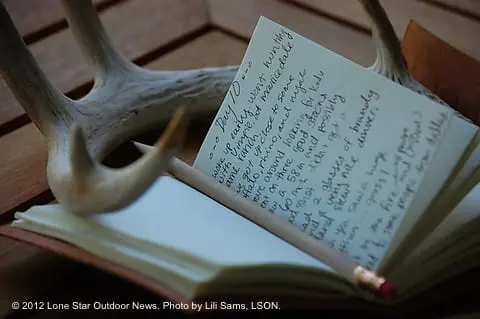 Gustavo Gonzales began keeping a journal of his hunting trips almost five years ago.
Gustavo Gonzales began keeping a journal of his hunting trips almost five years ago.
He wished he’d done it sooner.
“It’s probably been four or five years since I started writing stories about my hunts and stories from my childhood,” he said. “I found I have a passion for it, but I wish I’d done it sooner, since I was a kid.”
Gonzales said he writes most of his journal entries online, where friends and family can also read them. He said writing his stories leaves a legacy for his kids, and he is starting to teach them the value of keeping a hunting journal.
“I just wanted to share my ideas,” the San Antonio resident said. “I get comments from people and it makes me feel real good. I always wonder who will read my stories — that is a big motivation.”
Gonzales said he plans one hunting or fishing outing a month with his two boys, ages 3 and 12, and then he gets his older son to write about the experience.
“I am passing it on to him,” he said. “He enjoys sharing what he thinks and it is improving his writing skills.”
Even if you don’t want the information available to the public, journaling about an adventure while on the trip preserves details, thoughts and feelings that would otherwise be forgotten.
One group of hunters has maintained a journal for 20 years, and it has been used to reminisce, recall some of the more humorous events and settle some campfire disputes.
“If someone claims they all shot limits of ducks all through the year 2000, we can look it up and prove they’re bragging,” one of the hunters said. “Another guy claimed he had been at the lease longer than several of the others — we proved that wrong, too.”
Bruce Moon of Fort Worth keeps two journals.
“I got into hunting heavy about the time when Finn Aagard was writing for American Hunter,” Moon, who loads much of his own ammunition, said. “He was of the opinion that hunters should keep track of their bullet performance and that it’s the only way to get enough information.
“It’s more of a checklist, but I keep it for every gun I shoot and it’s been tremendously helpful — it can improve your ability as a rifleman.”
Moon calls his second journal “the big trip journal,” and recommends that all hunters keep one, especially when traveling to hunt.
“I put notes in it every day, they are more like bullet points, especially on a mountain hunt where you’re physically exhausted,” he said. “One time in Canada it was so cold I had to use two pens, keeping one under my armpit while using the other until it would freeze up. The next day I rewrote the bullets into sentence form and noticed how shaky my handwriting was.”
Using the information recorded in the journal, Moon has written several stories that have been published. His story about his 2010 goat hunt, called “One Last Mountain,” won the Dallas Safari Club Literary Award in January.
“These are wonderful moments, you’re going to want to remember them,” he said. “A big hunt is one-third preparation, one-third is the hunt, and one-third is the reminiscing. That is the only part that lasts the rest of your life.”

